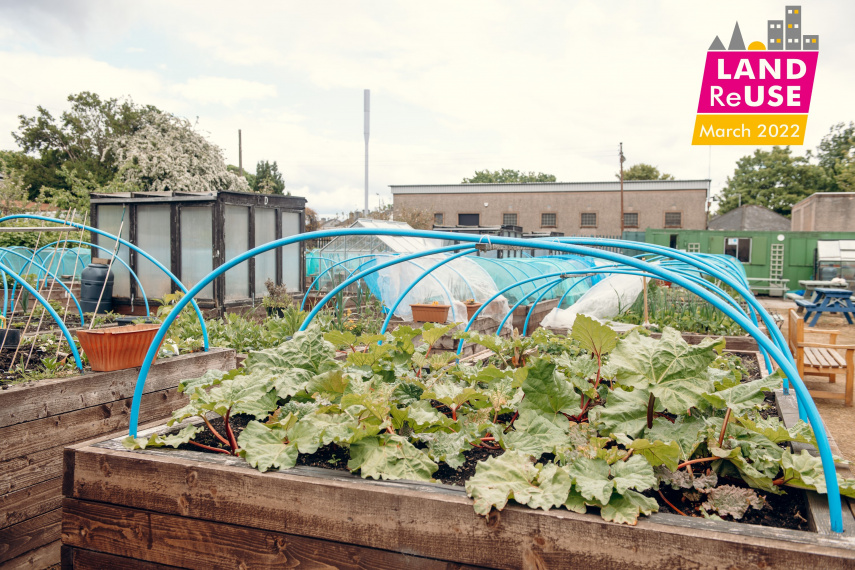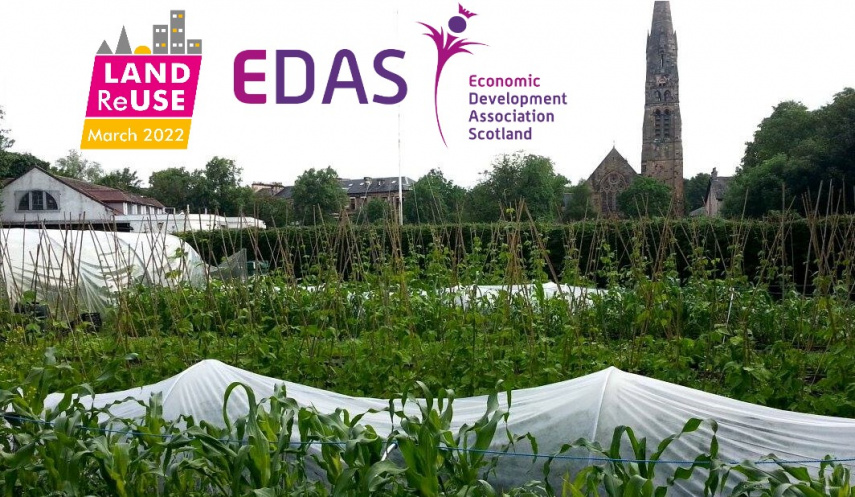
Not So Pretty Vacant: Transforming vacant and derelict land in Land Reuse Month – March 2022
Kathie Pollard
In a guest blog for LGiU Scotland, Kathie Pollard, one of the Commission's Policy and Practice Leads, explores the opportunities for local authorities and public sector organisations across Scotland to learn the 'how tos' of repurposing vacant and derelict land for community benefit in Land Reuse Month 2022 from 3-24 March.
The Scottish Land Commission holds regular public meetings across Scotland and a concern that we hear about time and time again – whether in Perthshire or greater Glasgow and Clyde – is the volume of abandoned and derelict land or buildings. This issue is particularly striking in town centres where empty units are left to become eyesores or land is neglected or abandoned.
The frequency of these concerns is not surprising, given that a third of the population in Scotland lives within 500 metres of derelict land. Scotland has almost 600 sites that have been registered vacant or derelict since the 2000s or earlier – and likely many more that are unregistered.
Such sites are an untapped part of the local economy. A piece of the 20-minute neighbourhood puzzle. A missed opportunity to address housing, climate and health challenges.
The COVID-19 pandemic has highlighted the importance of quality housing, access to local services, amenities, and jobs, as well as local action on climate change and biodiversity decline. The issues associated with vacant and derelict land show us why active land policies and good stewardship of land can fundamentally support wider national objectives, help us inequalities and move towards a wellbeing economy.
In 2020, the Vacant and Derelict Land Taskforce published a report putting forward policies and practical ways to address the issue of vacancy and dereliction in Scotland’s towns and cities. In response to the report, the Scottish Government created a £50 million low-carbon Vacant and Derelict Land Investment Programme with a focus on redeveloping long-term, challenging sites that have potential to deliver many win-wins for local authorities and communities that can support a range of social, economic and environmental outcomes.
The Commission has developed a suite of proposals to help tackle the problem of vacant and derelict land, including introducing Compulsory Sales Orders and the creation of Place Pioneers – a programme of affordable housing delivery utilising repurposed publicly-owned property assets in town centres and privately-owned housing stock in remote rural communities. We are working to make land rights and responsibilities central to land ownership and use. By working in partnership with the Development Trusts Association Scotland, a Vacant and Derelict Land project officer is working with community groups to transform several long-term derelict sites around the country.
There are promising Scottish Government policies on the horizon: a draft new national planning framework which emphasises repurposing land and buildings, and economic strategies including Scotland’s National Investment Bank, Clyde Mission, and community wealth building, which all have huge potential to support proactive land use.
Across Scotland, communities are taking ownership of sites and reusing these to deliver services and housing and a Community Ownership Hub Glasgow and Clyde Valley is being piloted to specifically help with this.
This is just a snapshot of the huge amount of work underway. Changing our approach to dealing with problematic vacant and derelict sites is complex and we have some way to go to make abandoning land a thing of the past. There are still plenty of things happening on the ground to show what can be done now.
The public sector is uniquely placed to pave the way and it will be the focus of the Scottish Land Commission’s Land Reuse Month, a series of online events taking place every Thursday morning from 3-24 March 2022. We will be holding a variety of free online events designed to support delivery of land reform in the public sector. Each week will focus on a different theme: understanding the opportunity on 3 March, collaborating with communities on 10 March, activating your estate (in partnership with Economic Development Association Scotland (EDAS)) on 17 March, and developing a strategy on 24 March.
We will spotlight practical tools and funding resources, case studies of real-life examples, and provide an opportunity to connect with other practitioners tackling the issues relating to regeneration, placemaking and land reuse. Register now for your free place.
Tackling the problem of vacant and derelict land isn’t easy, but working together gives us reasons to be optimistic. Join us for Land Reuse Month 2022 to find out more.

